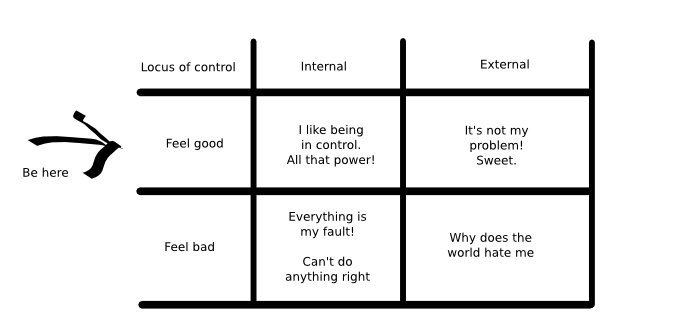This reads like the author has such a strong external locus of control that he can't even imagine how an actual internal locus works. The whole point of an internal locus of control for things you can actually control is to control them. For example, rather than the rationalization for inaction:
My house is a mess, it's my fault but I don't care.
the actual internal locus of control behavior is:
My house is a mess and I'm going to clean it up right now, that mean before replying to this comment.
The thinking here seems muddled.
Ordinarily locus of control refers to events in the future, explanatory style refers to events in the past. Your last 3 examples refer to past events but you switch back and forth between past and future when you break down each example. Anxiety is uncertainty, you can't feel anxious about events in the past.
Locus of control is about the degree of control you have over an outcome/event. Events are in themselves good or bad. How you feel about a future event is a consequence of whether or not that event is within your control and whether that event is good or bad. The way you've broken it down in your chart is it's your moods that are good or bad rather than the event itself. Your advice then seems to boil down to "choose to feel good about things all the time."
The degree to which a future event is within your control is a fact about the world, not a choice that you make. Choosing to go from external to internal over whether the sun will rise tomorrow is a recipe for self delusion.
Original post: http://bearlamp.com.au/repairing-anxiety-using-internal-and-external-locus-of-control-models/
I want you to examine your map. It's the representation you carry around in your head that says, "I am in control of most things" or it says, "most things are out of my control". Or for very specific things it says, "I am in control" or "I am not in control".
Factually - In the territory - through life things are more and less in your control or shaped by events beyond your control in the external world. Independent of your locus of control, can be noted the way you feel about a problem alongside whether it is internal of external locus of control. As a separation of cause and effect. (Of concrete event and their surrounding judgements, evaluations, conclusions or extrapolations)
This might already seem obvious but let's make some examples to play with. Here are some times that you might feel in control or out of control.
In these examples it's clear what's going on (the concrete) and it's supposed to be clear whether it's an internal or external locus of control, and the feeling is mentioned. Now lets play with them. Can we shift the concrete experiences to a different locus of control? from the original first example we can shift the event to the 4 quadrants above
But that's not the only example that can shift.
As we try each example...
Curious isn't it. Any concrete experience can be shifted to a good/bad feeling, and any locus of control can be shifted to a internal/external locus of control as well. As a person who has an ego that barely fits in the room, it means that I am very practised at living in that first row of the square. That means I am looking for a method that either obtains power/control for myself or bestows responsibility to the external locus of control. If you carry anxieties around with you, chances are they have some perspective that can be changed by hanging around in the other part of the square. Obviously this is not yet a method for getting you into the first row of the square but moving in that direction is the strategy below.
How?
The only method I want to mention in this article is to switch locus of control. So if you are in Internal-bad try switch to external and see what comes up. That is; move diagonally in the table. Going from; Internal-bad: My house is a mess and it's my fault. It won't get tidy unless I do something about it and it's bothering me. To: External-good: My house is a mess and it's my fault, lucky for me no one else cares! I can get away with it because it doesn't matter to anyone else and no one can see. While avoiding: External-bad: My house is a mess and it's my fault, what if anyone sees, I can't have friends over, what would they think of me? I have too much to do, life never gives me enough time to hold myself together How exactly? Try:
It would be very hard for a problem to be both entirely your fault (caused by you) and the world hating you (caused by external forces) at the same time. It's also remarkably hard to be in control of a problem and have it be not your problem. What I am saying is that it would have to either be your problem or not your problem. It would be hard to be both.
Meta: changing your internal models of locus of control is an internal locus of control method. Unless you propose, "this is the way I am I can't change it" which would be an external locus of control explanation. I don't know how to build on this so it will have to come in another post. having this out there will help to make it easier to build on later.
Meta: this took around 2.5 hours to put together.